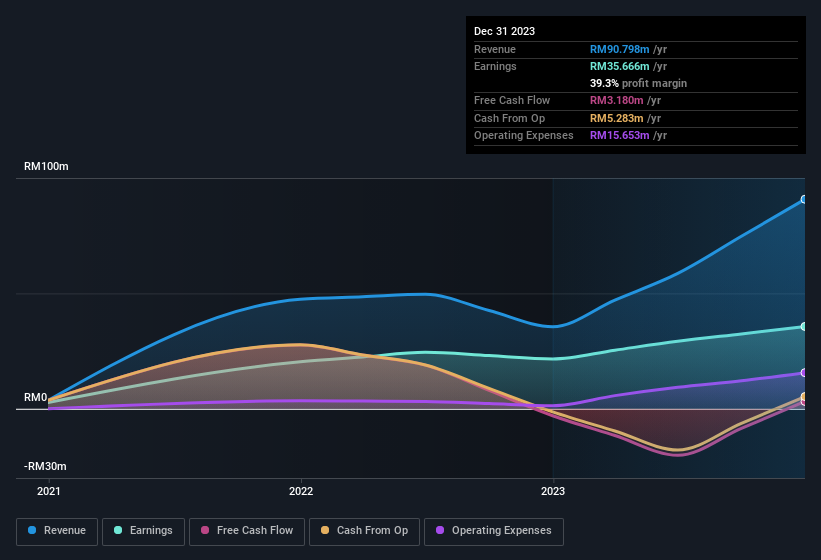- United States
- /
- Professional Services
- /
- NasdaqCM:VCIG
Why VCI Global's (NASDAQ:VCIG) Healthy Earnings Aren’t As Good As They Seem
VCI Global Limited's (NASDAQ:VCIG) solid earnings report last week was underwhelming to investors. We did some digging and found some worrying factors that they might be paying attention to.
View our latest analysis for VCI Global

A Closer Look At VCI Global's Earnings
In high finance, the key ratio used to measure how well a company converts reported profits into free cash flow (FCF) is the accrual ratio (from cashflow). The accrual ratio subtracts the FCF from the profit for a given period, and divides the result by the average operating assets of the company over that time. You could think of the accrual ratio from cashflow as the 'non-FCF profit ratio'.
As a result, a negative accrual ratio is a positive for the company, and a positive accrual ratio is a negative. That is not intended to imply we should worry about a positive accrual ratio, but it's worth noting where the accrual ratio is rather high. Notably, there is some academic evidence that suggests that a high accrual ratio is a bad sign for near-term profits, generally speaking.
Over the twelve months to December 2023, VCI Global recorded an accrual ratio of 0.58. Ergo, its free cash flow is significantly weaker than its profit. As a general rule, that bodes poorly for future profitability. To wit, it produced free cash flow of RM3.2m during the period, falling well short of its reported profit of RM35.7m. Notably, VCI Global had negative free cash flow last year, so the RM3.2m it produced this year was a welcome improvement. Unfortunately for shareholders, the company has also been issuing new shares, diluting their share of future earnings.
Note: we always recommend investors check balance sheet strength. Click here to be taken to our balance sheet analysis of VCI Global.
In order to understand the potential for per share returns, it is essential to consider how much a company is diluting shareholders. As it happens, VCI Global issued 31% more new shares over the last year. As a result, its net income is now split between a greater number of shares. To talk about net income, without noticing earnings per share, is to be distracted by the big numbers while ignoring the smaller numbers that talk to per share value. Check out VCI Global's historical EPS growth by clicking on this link.
A Look At The Impact Of VCI Global's Dilution On Its Earnings Per Share (EPS)
VCI Global has improved its profit over the last three years, with an annualized gain of 1,207% in that time. But EPS was only up 1,086% per year, in the exact same period. And the 65% profit boost in the last year certainly seems impressive at first glance. But in comparison, EPS only increased by 55% over the same period. Therefore, one can observe that the dilution is having a fairly profound effect on shareholder returns.
Changes in the share price do tend to reflect changes in earnings per share, in the long run. So it will certainly be a positive for shareholders if VCI Global can grow EPS persistently. However, if its profit increases while its earnings per share stay flat (or even fall) then shareholders might not see much benefit. For the ordinary retail shareholder, EPS is a great measure to check your hypothetical "share" of the company's profit.
Our Take On VCI Global's Profit Performance
In conclusion, VCI Global has weak cashflow relative to earnings, which indicates lower quality earnings, and the dilution means its earnings per share growth is weaker than its profit growth. Considering all this we'd argue VCI Global's profits probably give an overly generous impression of its sustainable level of profitability. If you'd like to know more about VCI Global as a business, it's important to be aware of any risks it's facing. For example, we've found that VCI Global has 5 warning signs (1 is a bit concerning!) that deserve your attention before going any further with your analysis.
In this article we've looked at a number of factors that can impair the utility of profit numbers, and we've come away cautious. But there is always more to discover if you are capable of focussing your mind on minutiae. For example, many people consider a high return on equity as an indication of favorable business economics, while others like to 'follow the money' and search out stocks that insiders are buying. While it might take a little research on your behalf, you may find this free collection of companies boasting high return on equity, or this list of stocks that insiders are buying to be useful.
New: Manage All Your Stock Portfolios in One Place
We've created the ultimate portfolio companion for stock investors, and it's free.
• Connect an unlimited number of Portfolios and see your total in one currency
• Be alerted to new Warning Signs or Risks via email or mobile
• Track the Fair Value of your stocks
Have feedback on this article? Concerned about the content? Get in touch with us directly. Alternatively, email editorial-team (at) simplywallst.com.
This article by Simply Wall St is general in nature. We provide commentary based on historical data and analyst forecasts only using an unbiased methodology and our articles are not intended to be financial advice. It does not constitute a recommendation to buy or sell any stock, and does not take account of your objectives, or your financial situation. We aim to bring you long-term focused analysis driven by fundamental data. Note that our analysis may not factor in the latest price-sensitive company announcements or qualitative material. Simply Wall St has no position in any stocks mentioned.
About NasdaqCM:VCIG
VCI Global
Provides business and technology consulting services in Malaysia.
Excellent balance sheet and good value.
Market Insights
Community Narratives




